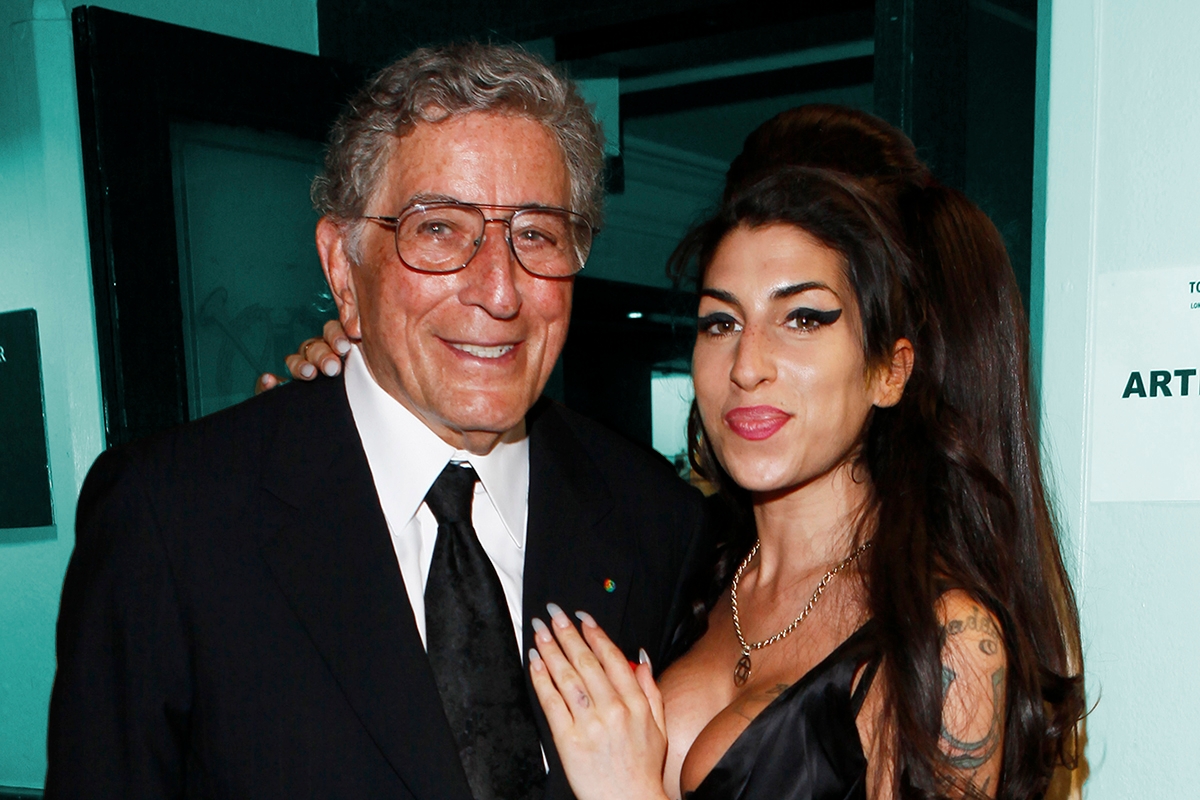Tony Bennett, who passed away July 21st at age 96, forever changed the face of music. The musician, who gave us songs like “I Left My Heart in San Francisco,” came from an Italian immigrant family, but many Jewish stars inspired him and collaborated with him, from Irving Berlin, for whom he recorded a whole tribute album, to Billy Joel, whom he joined in a couple of concerts.
Yet Bennett’s most famous and touching collaboration with a Jewish star was without a doubt his 2011 duet with singer Amy Winehouse — one of the last recordings of the groundbreaking Jewish singer before her untimely death, which was featured on his album “Duets II: The Greatest Hits.”
In March of 2011, Bennett flew to London to record a cover of “Body and Soul” with Winehouse, who had been absent from the recording studio for a while. For an entire day, they worked on this sweeping, enchanting and truly unique rendition of the 1930 Jazz standard written by Edward Heymann and composed by Johnny Green.
Winehouse passed away before the song was ever released to the public, in July of 2011, at age 27. The single ended up being released on what would’ve been her 28th birthday. When it charted on the Billboard Hot 100, it made 85-year-old Bennett the oldest living artist to ever appear on the list. It also won him and Winehouse another Grammy Award (Bennett won 20 in his lifetime, while Winehouse won six — one of which, her 2008 Album of the Year award, was presented by Bennett himself).
In an interview with Howard Stern a few days after the single’s release and three months after Winehouse’s death, a heartbroken Bennett shared that her passing was “a great loss.” He wanted her to be at his 85th birthday concert at the London Palladium that year, he recounted.
“I wanted Amy to be on that show,” he confessed, brimming with emotion. “I wanted to sit down with her and tell her that when I was younger I took a left there for a while,” referring to the time he, too, had a drug problem in his youth. It was actually a story about Jewish comedian Lenny Bruce, one that he wished he had told Winehouse, that helped him quit drugs. One day, he met talent manager Jack Rollins (born Jacob Rabinowitz) and asked him what he thought about his former client, Bruce. “He sinned against his talent,” Rollins stated. That simple statement struck Bennett and changed his life forever. He recounted how he also wanted to tell Winehouse the two simple words Sinatra told him when he using drugs: “Slow down.”
Bennett may not have been able to share the words that helped him through his problems with substance abuse, but he did show Winehouse so much grace and warmth through their interactions when she was alive.
A behind-the-scenes video of Bennett and Winehouse show just how tender and supportive he was to the singer when they worked on the song together. Winehouse was incredibly nervous and excited, and worried about messing up. It had been three years since her last album, “Back to Black,” came out in 2006.
“This is weird,” she told Bennett.” I’ve never done anything like this… to sing with one of my idols.”
“Oh no, it’ll be wonderful,” Bennett assured her. Winehouse made sure she felt seen and comfortable during the recording, asking if the temperature felt good to her and inquiring about how her father, who attended Bennett’s concerts with her, was doing. (Amy jested that her father, Mitch, was incredibly jealous, because like her, he was a big fan of Bennett’s. “We love you so much,” she shared.)
Winehouse was struggling with the song — her cover was hardly straight or traditional — but Bennett was captivated by her singular style and talent. “To me, she sings it the right way. There’s a lot of straight singers that sound wonderful, but she thinks for the moment, and that’s honest, if there’s anything that I love it’s an honest performer,” he said.
A few times, Winehouse asked to stop the recording and start over, saying she sounded bad. “Sorry, I was terrible, I don’t want to waste your time,” she told the icon.
Bennett kept assuring her that she was getting better. “You’re not in a hurry, right, and I’m not either,” he told her kindly, and made sure she knew he loved her singing. “It’s getting better each time, and you sound wonderful.”
To distract her, he asked her if she was inspired by singer Dinah Washington, who was a friend of Bennett’s.
He recalled when Washington would show up in Vegas unannounced, “and just say ,’I’m here boss,'” and that every performer and guest on the strip would flock to see her.
“She’s one of my favorite singers of all time,” Winehouse told Bennett, and lamented that “she died so young, she wasn’t even 40.”
“She had a tough life,” Bennett responded solemnly, in what feels like a dark moment of premonition. Washington died of a drug overdose at 39, while Winehouse died of alcohol poisoning.
Despite the hardships during the recording, Bennett loved Winehouse’s adventurousness and freshness. “She’s ready to take chances, right on the spot,” he said, comparing her to other great improvisers like Louis Armstrong, Nat King Cole, Frank Sinatra and Ella Fitzgerald. “It’s about making a great performance not quite like anyone else, and to be daring enough to take that chance and hope that it works.”
It’s exciting to live that way, Bennett added, because then, “you perpetually grow.”
“Here I am, going on 85 this year, and I can tell you I have a lot to learn,” he said. What an incredible approach to life.
Thank you, Tony Bennett, for all the chances you took and the music you gave us. Your songs will always be a blessing to us all.








